The New York Athletic Club’s dress code is an un-fickle thing, spelled out in such clarity and enforced with such rigor that its violators must be presumed to be flouting it intentionally. Within the sparkling marble lobby of the club’s Central Park South location, for instance, jeans, T-shirts, and shorts are verboten. The exceptions to the code are reserved for those exceptional athletes who train there; they can wear tracksuits and sweatpants so long as they use a rear entrance and proceed directly to the club’s basement training facility. Among those athletes are members of the U.S. national fencing team, and among those team members is Eli Dershwitz, who practices there every Thursday and who was, as of July 2023, the best male saber fencer in the world.
The two options to enter — the more formal front and the gym-casual back — are themselves a reflection of Dershwitz. Duality has defined him and his career on the fencing circuit. On the days that he has an official competition, he follows a routine so exacting that he can track and tally the seconds between each stage of it: waking up to making his first cup of coffee, making breakfast to finishing his second cup, taking a shower to packing an equipment bag, texting his coaches to getting taped for his training session.
“I don’t like chaos with respect to things that could be done efficiently,” he said, because that efficiency allows him to narrow his concentration, laser-like, on his tactics, his attitude, and his conditioning — all the elements that together make him an elite fencer.
At Harvard, where before graduating in 2019 he won two individual national championships and four Ivy League championships, he treasured and thrived within the structure of the program’s norms and rules: Your phone had to be turned off 10 minutes before warmups. Your fencing shoes had to be on your feet at the start of practice. You had better be ready to go.
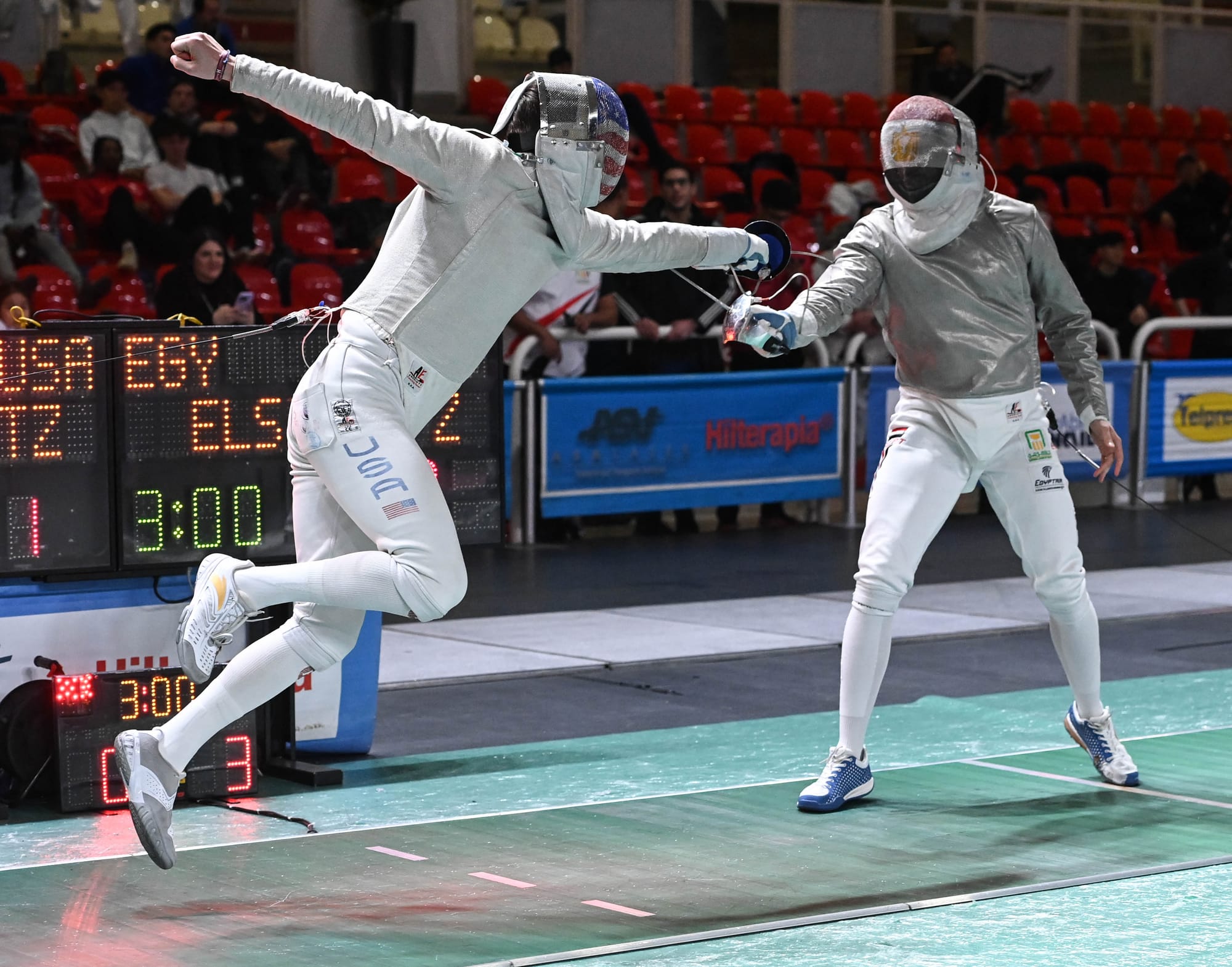
“I want to be in a training environment that’s so disciplined and rigid that it forces you to be very intentional and aware of what’s going on every second,” Dershwitz, who will turn 29 in September, said. “If you can get in that habit of being aware mentally of what’s going on with yourself, your movement, your opponent’s movement, you can make adaptations in yourself and your game much faster.”
Good luck finding anyone in the sport who adjusts faster than Dershwitz. He won the United States national saber championship in 2014, the youngest fencer to do so, when he was just 18. He became the first American to win an international individual saber championship the following year, at the Junior World Championships.
In the summer of 2023, in Milan, he captured the men’s saber world title, staging a stunning rally from a six-point deficit in the semifinals for a 15-13 victory over Hungary’s Aron Szilagyi, who is merely the only male fencer with three individual Olympic gold medals. “It just looked hopeless,” Mark Dershwitz, Eli’s father, said. “There was no possible way that anybody on the planet looking at Eli fencing Aron Szilagyi gave him any, any possibility of coming through. And he did.” The 2024 Paris Summer Games will be his third Olympics. A gold medal, elusive so far, remains a goal.
In Dershwitz’s everyday existence, though, that self-discipline often disappears. “I’m very laxed,” he said. “I’m a little bit dirty.” When he arrived home from Budapest after the 2024 World Cup, he didn’t bother unpacking his bags — bags full of steaming, stinking, sweaty fencing gear — for at least 24 hours. Whenever his girlfriend, Keren Baranov, is out of town for a few days, Dershwitz lets used dishes pile up in the sink of the couple’s New York apartment. But every conversation that Baranov happens to have with one of Dershwitz’s training partners eventually turns into a litany of his demands and admonishments of them: He’s always yelling at me. He’s always telling me this drill was crap or that drill was crap. He’s always saying you have to be early to be on time.
How can she reconcile that hardass with the same sweet guy who carries around, at all times, three talismans from his childhood? There’s the bracelet of bottle caps that his twin sister, Sally, made for him in middle school. There’s the small, unopened bottle of hot sauce that a coach gave him years ago. (“I used to put hot sauce on everything,” he said.) There’s the tiny glass turtle that reminds him of being a boy, trying to catch the little creatures in a lake. He has kept the items in the same ziplock bag for 10 years; for all the guardrails that he prefers in his fencing career, nothing else calms his nerves and clears his mind as the security of knowing they’re close at hand.
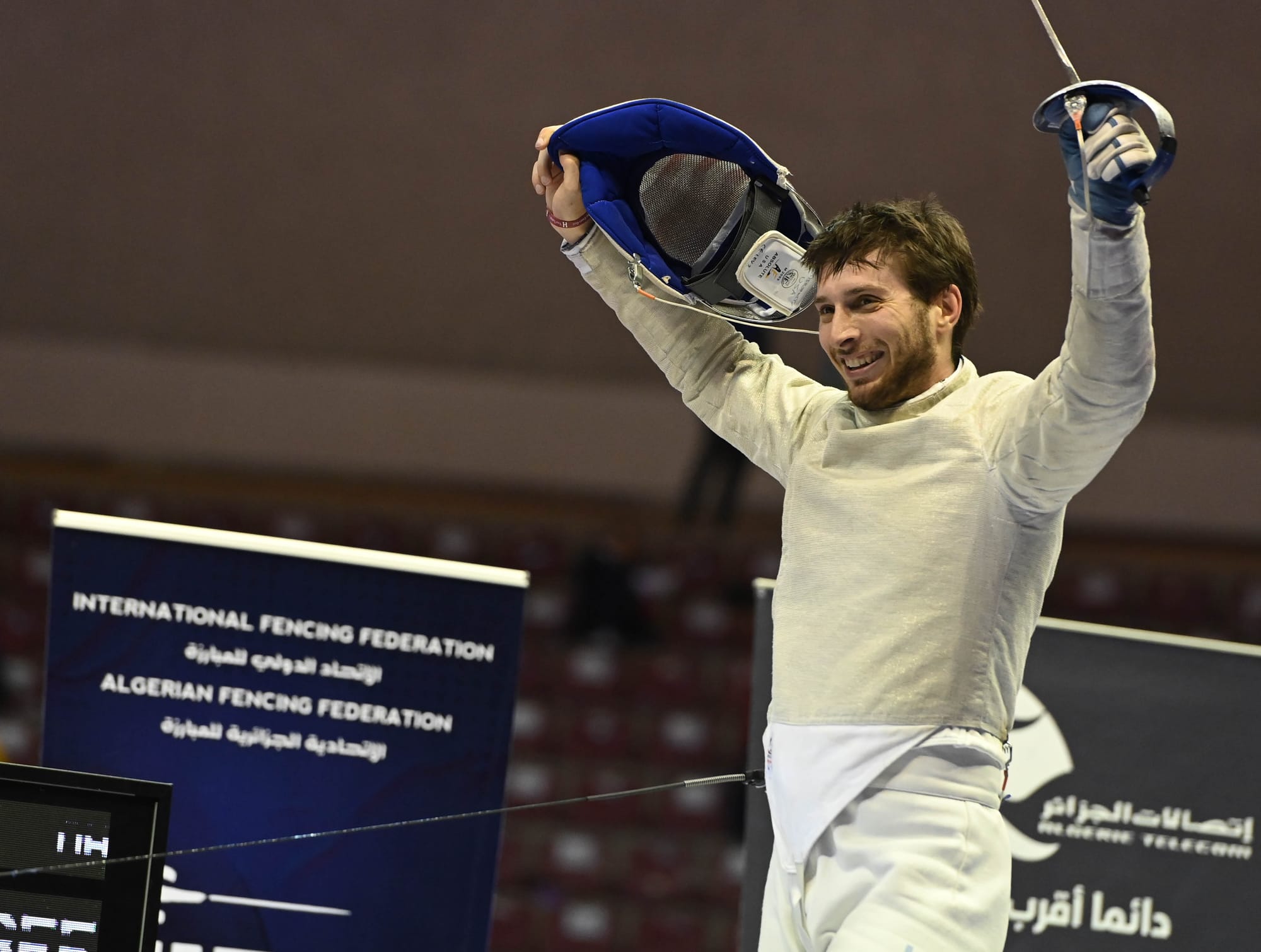
“It’s all about what I think the end result will be,” he said. “When I think about my training, my rehab, my nutrition, my hydration, sleep, mobility, injury prevention, I’m very certain that if I’m not diligent, my body won’t survive. It’s more of a necessity to me that I’m organized with that. I don’t like to over-worry about details that I don’t think will affect me. It’s more mental capacity to focus on fencing.”
It’s as if there’s a thin membrane separating each of these realms in his life, and he passes through it and back again whenever he has to: officious to sloppy, obscure to famous, past to present. Let’s begin with the past.
Mark Goetzler was Dershwitz’s maternal grandfather, and Mark Goetzler had it easy, relatively. During World War II, he and his family fled from Poland to the Soviet republics, settling in Uzbekistan — no choice at all for eastern European Jewish people, of course, compared to facing Hitler’s final solution in their homeland. No, the Goetzlers’ escape was nothing next to what his bride-to-be did. For three years, Renee Schmukler, her parents, and her brother hid in the back of a barnhouse, sleeping on bales and piles of hay, surviving on the generosity and humanity of a farmer who went so far as to send away his youngest children to live with relatives for fear that they would reveal their location to the Nazis. An elder daughter stayed and brought food to the Schmuklers, who eventually made it out of Poland, sailed to Ellis Island, and began a new life in the suburbs north of New York City. There, Renee met and married Mark.
“Kind of an Anne Frank story,” said Renee Dershwitz — Mark and Renee’s daughter, Eli’s mother. “With a better ending.”
The story of his maternal grandparents’ withstanding the horror of the Holocaust is never far from Dershwitz’s thoughts. Until her death in 2011, his grandmother spoke to him only occasionally, and never with much specificity, about her experiences in Poland. “She talked more to my mom,” Eli said, and in those conversations she revealed and discussed the details of her and Mark’s youth so that the stories might be handed down — a family oral history. In 2015, during a junior fencing competition in Tashkent, he, his coach, and some of his teammates journeyed nearly 200 miles south to Samarkand, in eastern Uzbekistan, to try to find his grandfather’s grave. They couldn’t.
“I’m beyond thankful my grandparents were able to come to the U.S.,” he said, “able to make a life for themselves. I have a tremendous amount of pride competing for the U.S. and often competing in the country my grandparents left. My parents tell me my grandparents would be proud and beyond happy. They couldn’t imagine me going back to compete on the world stage in a crowd that maybe didn’t want them there a hundred years ago but now they’re cheering for me. That connection has always meant a lot to me.”
He majored in history at Harvard. His favorite movie is Sunshine, a 1999 film, based on true events, that tracks multiple generations of a Jewish fencing champion’s family in Hungary throughout World War II; he wrote his college admissions essay about it. “I really appreciate the beauty of seeing a connection between family and country and sport,” he said. He is cognizant, according to his father, that fencing has always been more popular in Eastern Europe than in the United States — and that, for much of that time, most of the fencing clubs there would not admit Jews as members. Yes, there is that awareness of history …
… and then there is the reality of the here and now, of his status and experiences and relationships within his sport, of his need to maintain balance and sanity in a world that seems to lack both. During a media availability in May 2024, for instance, a reporter peppered him with questions about the difficulty of being a high-profile (relatively speaking) Jewish athlete in the aftermath of Hamas’s October 7 attacks on Israel. Dershwitz blocked and deflected each one as if he were a goaltender in a pregame shooting drill. “In terms of conflicts in the world,” he said, “I would prefer not to talk about specifics.” He had traveled to so many regions of the globe, made too many friends, and come to respect too many competitors in too many distant countries to start spouting off on international politics.
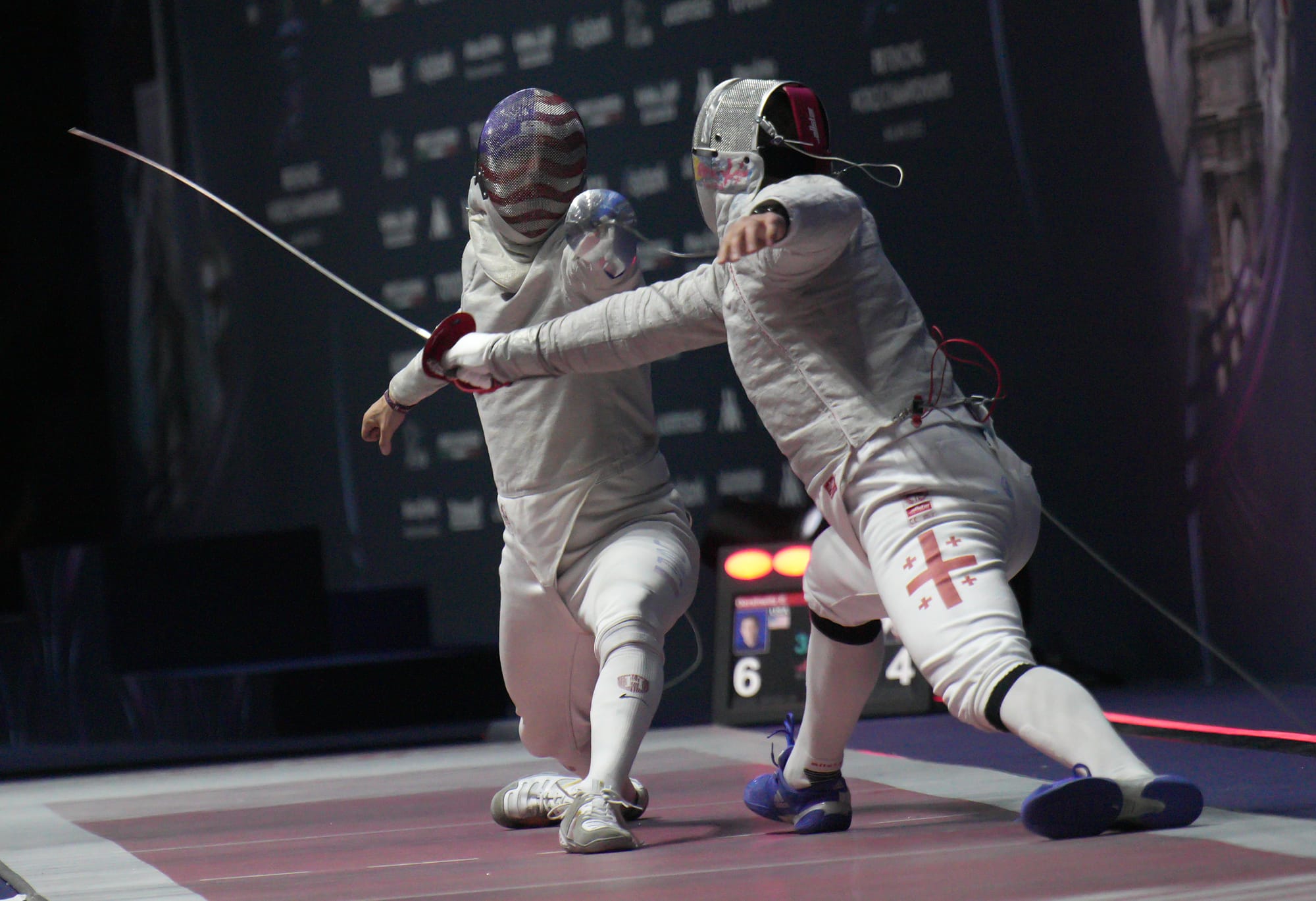
“As an athlete,” he said, “I have to be able to compartmentalize my life and structure my thoughts and training separately from what’s going on in the world. I try to be very well-read and keep up with politics, and I have very strong beliefs about what’s going on in the world, but I try to keep that very separate from my athletic career.”
How could he do otherwise? The sport and its people had given him so much, and his connection to it is so personal. His brother, Phil, three years older, had found fencing at a summer sports camp not far from the Dershwitzes’ home in Sherborn, Mass., and when Phil jumped at the chance to join a fencing club in town, Eli, just 8 years old, followed him there.
Even at that early age, he was drawn to the sport’s combination of creativity and restraint — the clarity and inflexibility of the rules, the freedom to develop an individual style within those rules. By his mid-teens, he had reached a world-class level, so committed to climbing the ranking that, if he started to slack off in school, all his mother had to do to scare him straight was invoke the name of his coach, Zolan Tulum. Get in trouble? Bomb an exam? OK, Eli. I’m telling Z.

“Tough love,” Dershwitz said, “is something I believe in.”
So his teleporting between those two realms, between adolescent and athlete, continued. It had never ceased. He missed his older brother’s graduation from Princeton because he was competing in Europe … or South America … he couldn’t remember. Hell, the kid skipped his own junior prom. “If you’re worried about your ranking or making an Olympic team,” Renee said, “you can’t miss a big international competition. You have to be there.”
Now he was approaching his physical and intellectual prime, and now even more was at stake. He took a year off from Harvard to train, qualified for the 2016 Summer Games in Rio before his 20th birthday, returned to the university that fall for his sophomore year and got accustomed to writing essays and research papers in, say, the Lufthansa lounge of whatever airport he happened to be passing through on his way to or from another tournament.
What’s that line from The Social Network? Harvard was “a campus that included 19 Nobel Laureates, 15 Pulitzer Prize winners, two future Olympians, and a movie star.” It was also, by the time Dershwitz graduated in 2019, a campus that included a trim 6-foot-1 man with fluffy brown hair who was already an Olympian, who was a two-time national champion, who, if you passed by him in Harvard Square, would have given you no cause to think that he had hobnobbed with Michael Phelps and Carmelo Anthony — that he was as highly regarded in his sport as those celebrities were in their theirs.
There are three styles of fencing: foil, epee and saber. In foil, one must establish “right of way” before he or she can score a point, and in epee, a fencer can score by touching the opponent on any part of the body. Those rules compel competitors to be careful and more wary of a false move. Watching a foil or an epee bout is like watching a tense, slightly sensual dance.
Watching a saber bout is like watching two redbirds fight — nothing but flashes of aggressive movement, sharp edges stabbing and slashing and darting, every violent stroke targeted above the waist and delivered with blades that are lighter than those in foil or epee. The exchanges last a couple of seconds at most and seem charged with an electric current. When a saber bout is finished, it’s damn near impossible to know who has won or why.
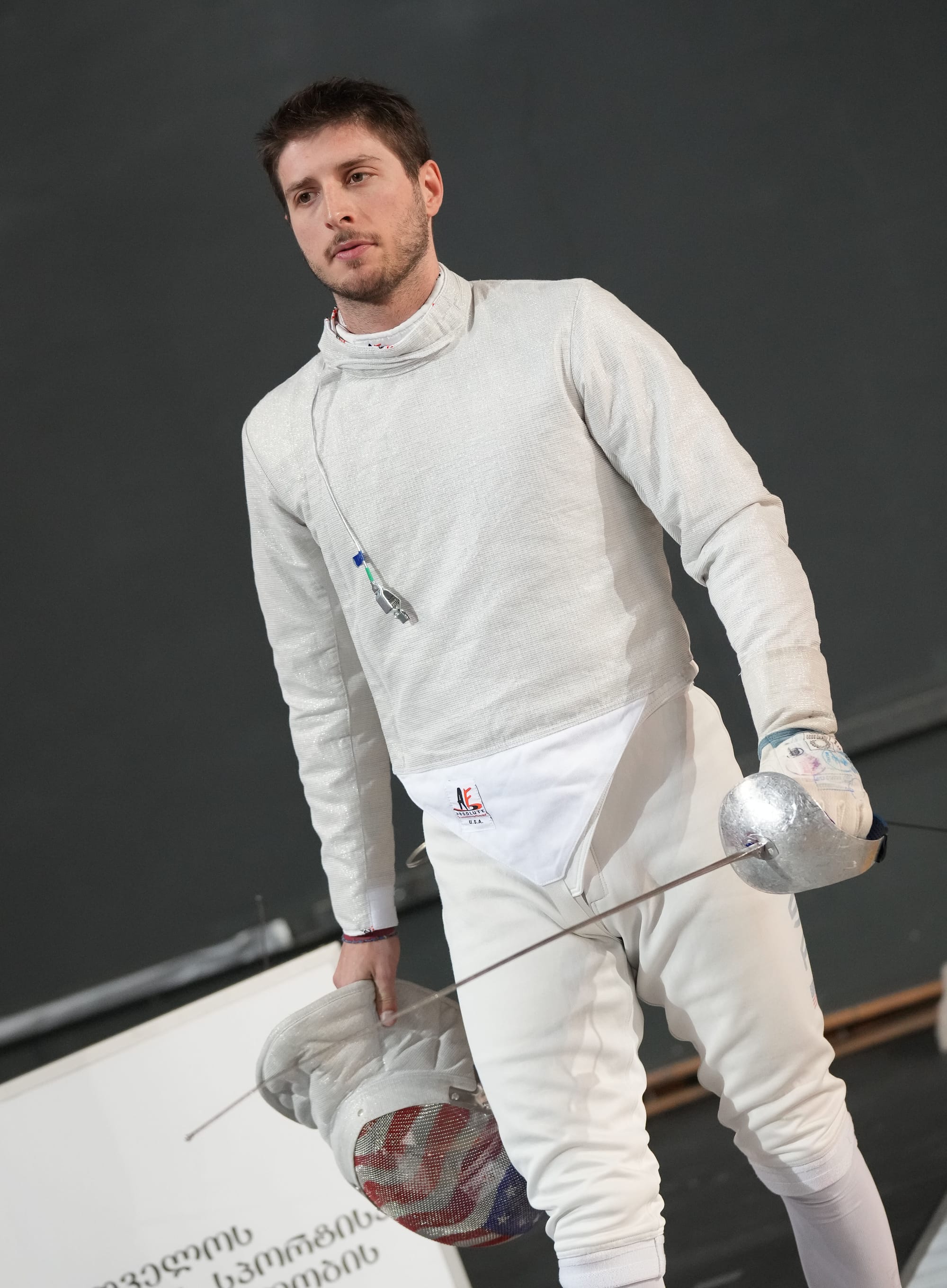
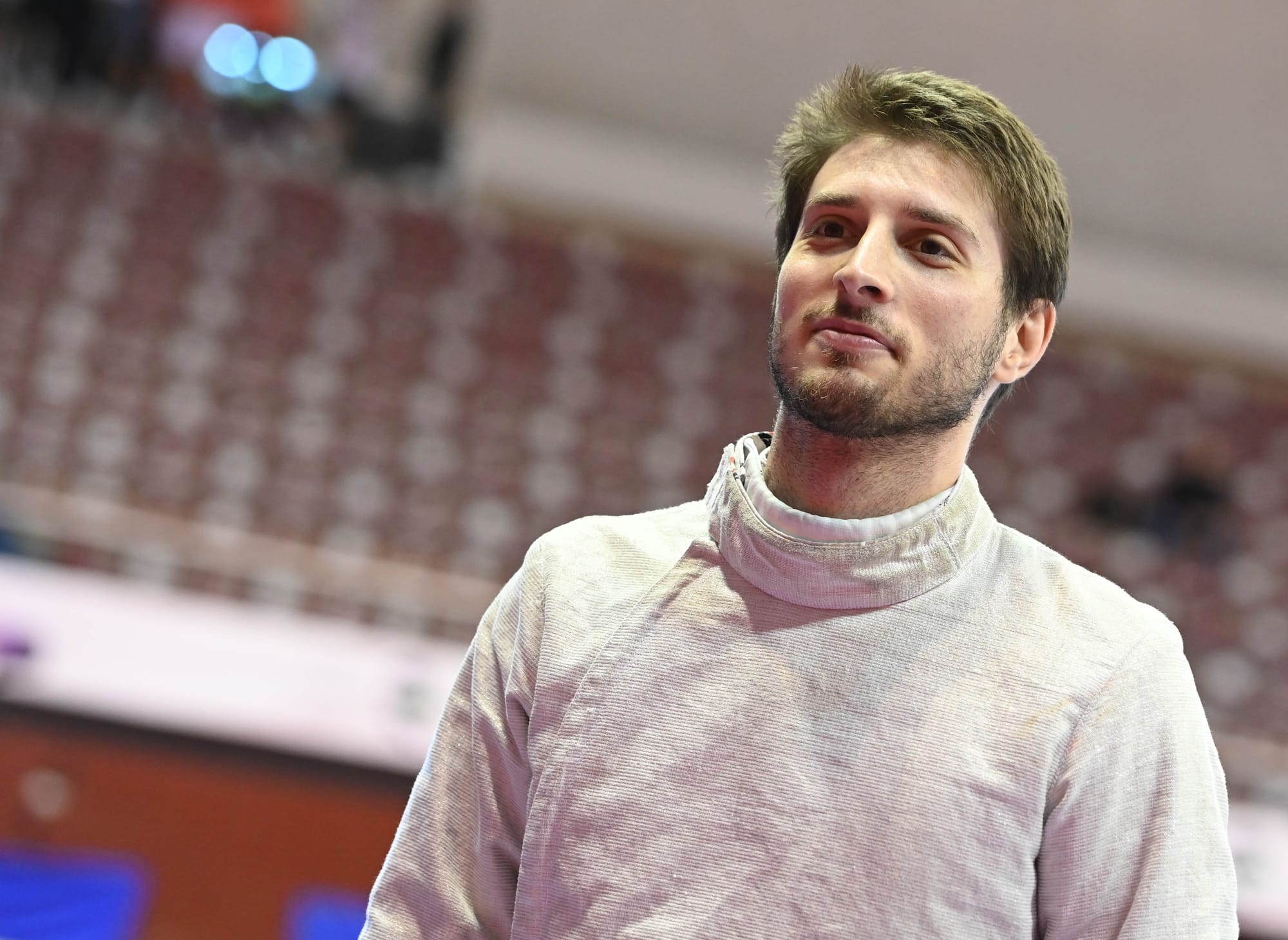
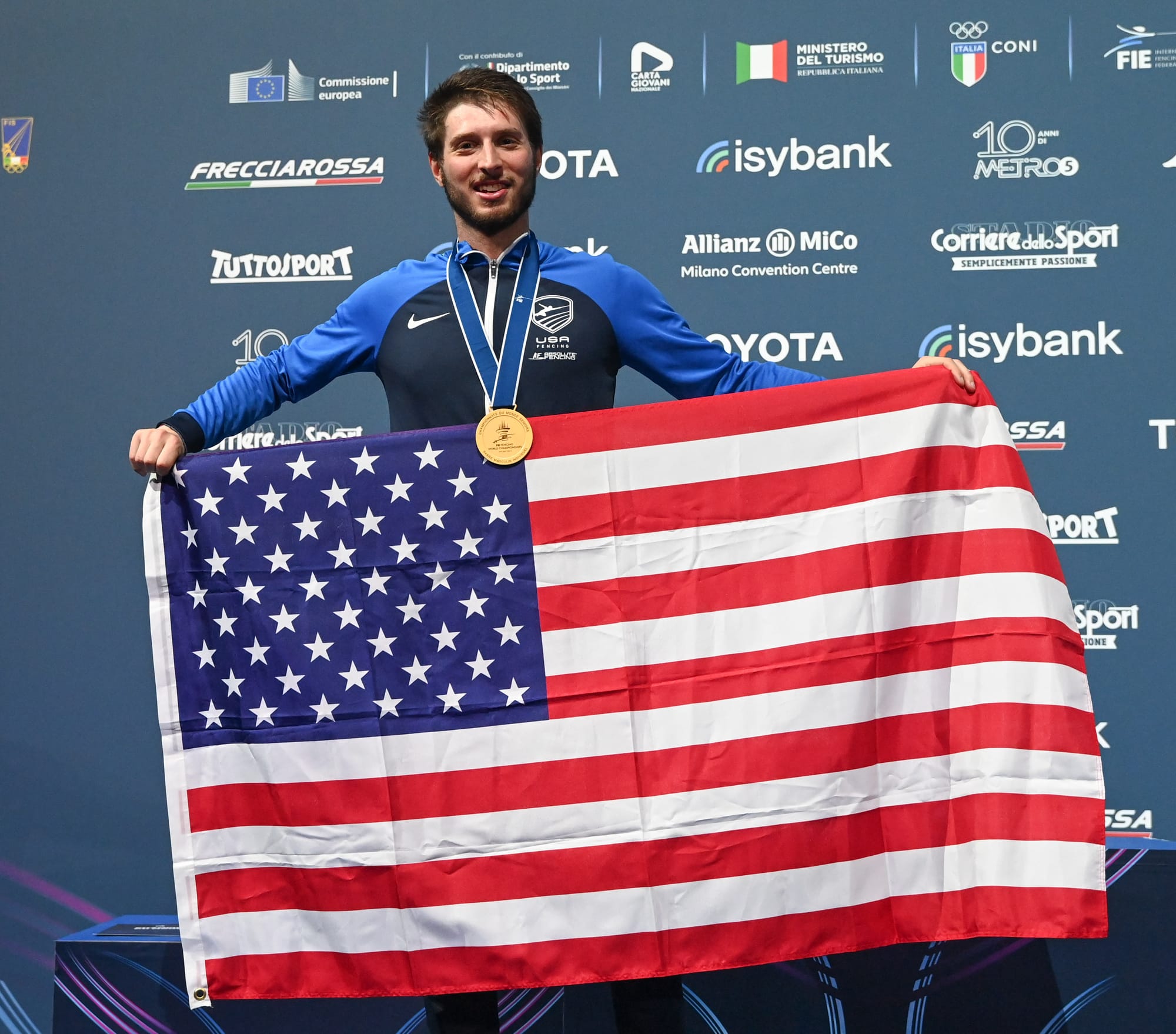
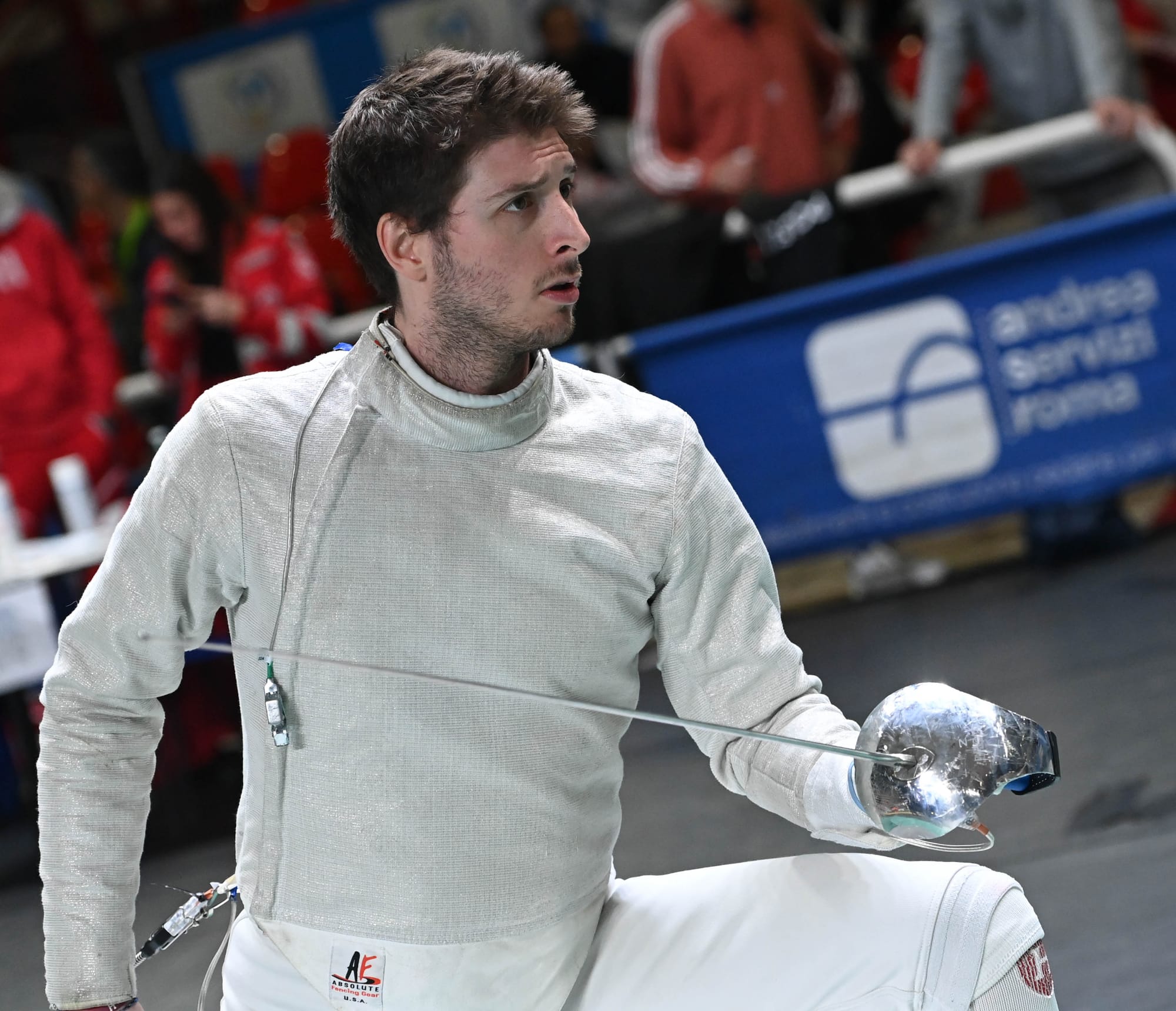
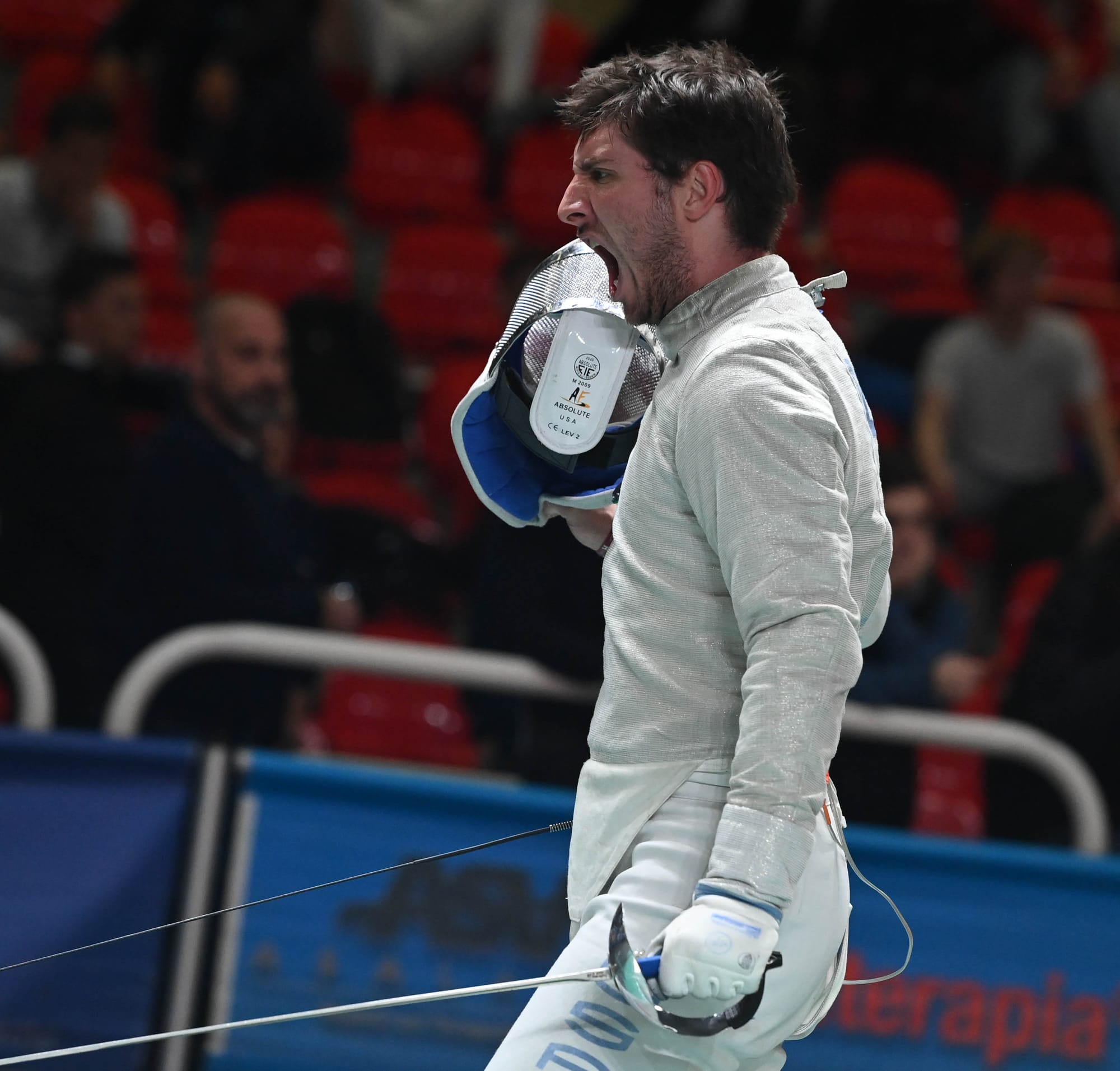
Eli Dershwitz, the top male saber fencer in the world as of July 2023, enters the 2024 Olympics in Paris in search of an elusive gold medal. [#BizziTeam via USA Fencing photo]
Dershwitz would love for fencing to become more popular in the United States, but it first, he said, has to become more spectator-friendly and accessible. It also has to retain more of its best performers, and that’s a challenge given the concentration of academic achievers that the sport draws. Among all Division I sports, male and female fencers compile the highest average high school GPA of entering athletes, according to NCAA research from 2018.
“What tends to happen is a lot of people try to work part-time and train part-time, and it’s hard to be the best at both at the same time,” Dershwitz said. “With the possibility of going to work in the corporate world right out of college and getting a nice paycheck, or with the possibility of training for making the Olympics and maybe getting a medal, a lot of people have trouble balancing those two objectives.”
He does not. At Harvard, he never received a job offer that gave him pause about ending his career. He could disregard the either-or choice that so many of his peers had to make; for him, it was never a choice at all. “If my main goal early in my life was just to make bank,” he said, “I probably wouldn’t have picked fencing. That would be the stupidest thing I could do in my life.”
No, the sport consumes him as little else, if anything, does. His loss in the round of 16 at the Tokyo Olympics in 2021 compelled him to chase gold at Paris in 2024 as one of the elder members of the men’s team. “Something inside me was like, ‘I can’t finish like that,’” he said. After some tournaments, he will experience what he called “12-hour black holes,” in which he can remember nothing about his bouts — no points, no details, nothing — so total was his concentration on and immersion in the moment. Only by watching a replay on YouTube can he recall half, maybe, of what he was thinking and sensing during a match.
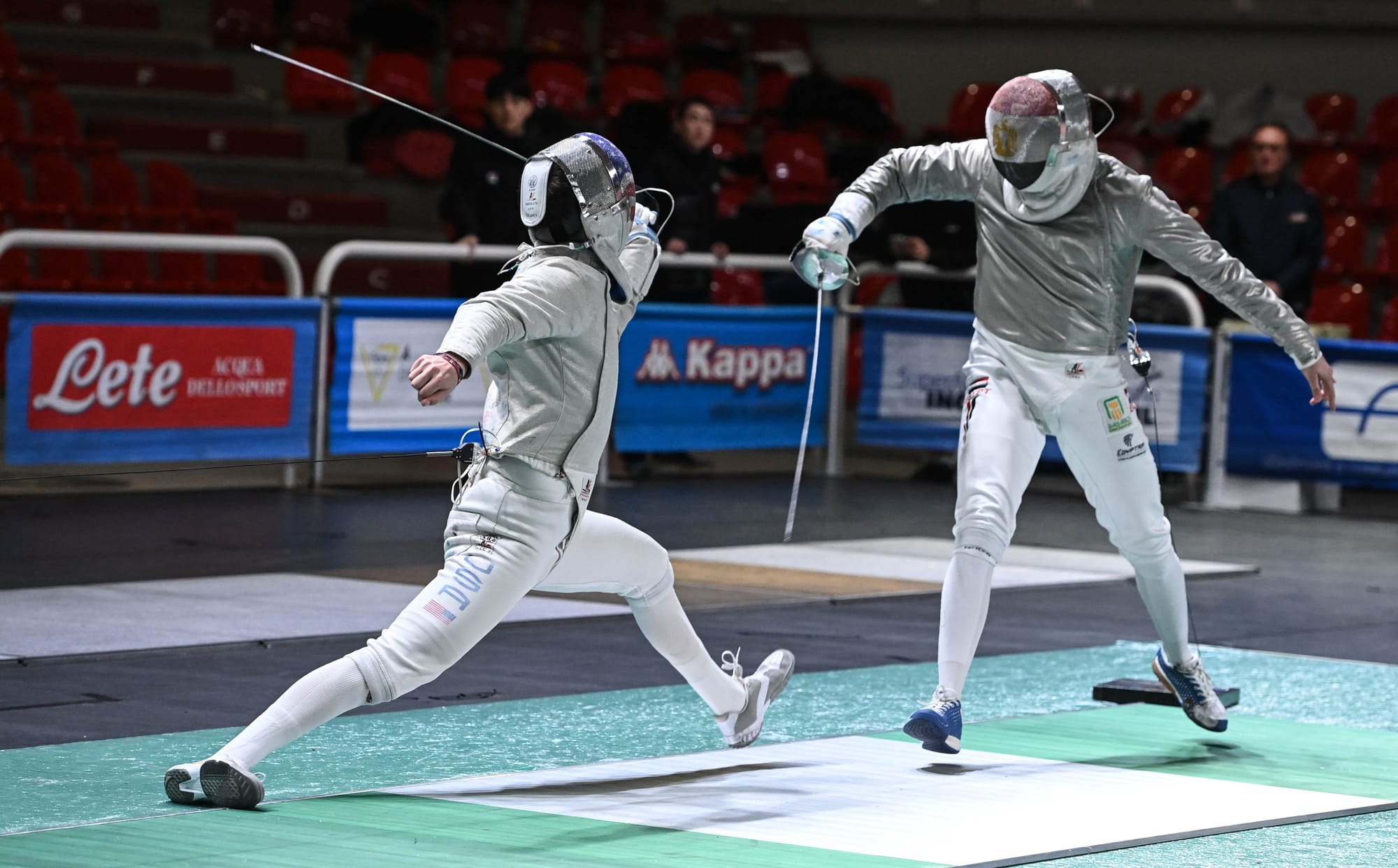
In his semifinal victory at the ‘23 world championships, an overwhelming sense of freedom came over him after he spotted Szilagyi a 10-4 lead. Whatever pressure he felt vanished like a post-dawn fog. His comeback was calming for him and excruciating for everyone else. “Eli is notorious for falling behind and coming back,” Mark Dershwitz said. “It’s often nerve-wracking.” At the office of the hedge fund where she works, Baranov watched an online feed of the bout, and one by one, her coworkers gathered around her computer. Later, as she was watching Dershwitz’s victory in the championship bout, a 15-6 rout of Georgia’s Sandro Bazadze, a portfolio manager came by.
Wow, he said, this guy’s amazing.
Well, Baranov said, you didn’t see every single match.
She left unsaid what anyone who knows Eli Dershwitz already knew: He had earned the right, upon arriving home in triumph, to leave the dishes stacked in the sink. He had earned the right to be himself, both sides of himself, all of himself.